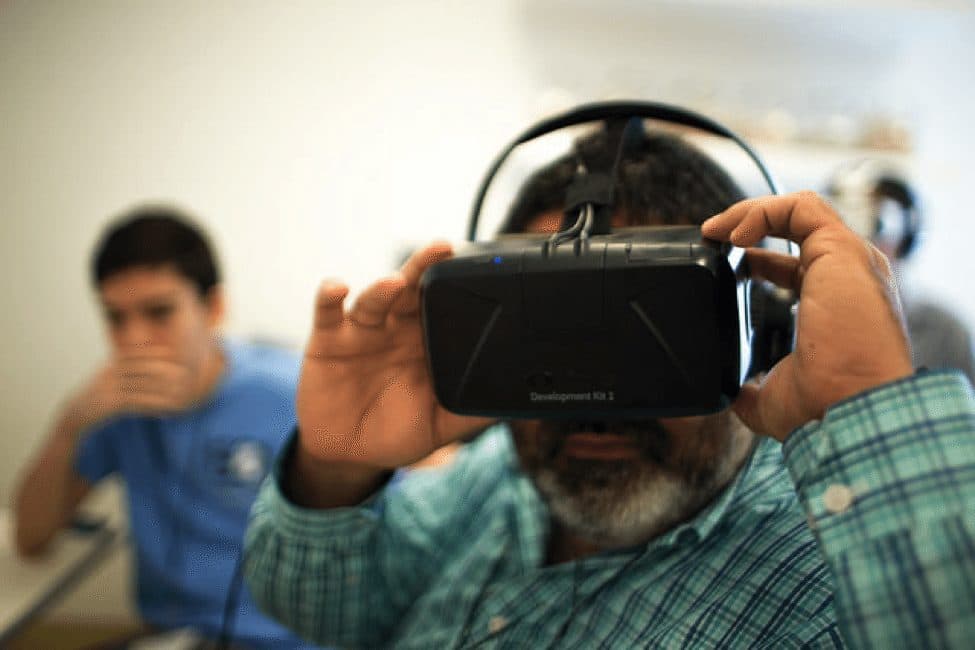Virtual reality (VR) is a unique puzzle in copyright infringement because of its relative newness—at least, compared to other copyright-protected materials. Despite that, we have a pretty good idea of the technology’s potential, as anybody familiar with the Enterprise-D’s holodeck can testify to. A television show, book, or sculpture is presented to the viewer as a 2-D image, but virtual reality arguably takes the viewer and places them into the world beyond the screen, allowing for a true 3-D experience. It is the difference, in short, between the augmented reality of Pokemon Go and the virtual reality of the Oculus Rift.
As virtual reality technology develops more, Federal copyright policy will likely evolve with it. Because VR is an “original expression” it is no doubt protected by copyright. However, the unique nature of virtual reality as a technology provides several important issues that game designers should consider when trying to avoid copyright infringement.
Can You Copyright the Holodeck?
Some federal courts have already begun defining virtual reality, with at least one describing it as “a computer generated three-dimensional immersive environment that allow[s] movement and navigation” in Lamson v. United States. Because of this, the Copyright Office’s definition of copyrightable material would include virtual reality content, under the heading of computer programs. So VR computer programs would be copyrightable in at least two different ways: first, in their audio/visual elements; and also in the mechanics of the world itself.
How Would Audio and Visual Copyright Work in Virtual Reality?
With regards to visual and audio aspects of expression, copyright infringement would at probably be largely the same. Legislation regarding copyright infringement in digital media already exists, and it is likely that the guidelines of reporting and notifying a digital user of copyright infringement would be largely the same. So the framework for reporting copyright infringement already exists. That said, is a virtual reality copyrighted image different from a 2-D copyrighted image? Would, for example, a picture that you can touch and turn over in a VR environment be sufficiently unique to have its own copyright from the original real life version? Likely not, because it would not rise to the level of being a sufficiently original expression. However, these cases of infringement are not yet clear.
Can You Copyright Gravity?
Probably not, but maybe! If you drop a ball in your virtual reality game (at least, one with gravity), presumably it will fall. If it did not, the virtual world created would not be realistic for the viewer. This separates VR from most other forms of media, because the mechanics of dropping something are tied to the actions of the viewer, as opposed to a television show where the viewer does not have the same impact. So in order to create a virtual reality experience, the mechanics of the VR environment are just as important as what the viewer is seeing, hearing, and even smelling.
A good example is touch. If virtual reality touch were to advance to the point that a unique method of touch were to fall within the definition of “original expression,” then the mechanics of that may fall within copyright, rather than a patent. Similarly, if somehow gravity was modified within a virtual reality setting in an original way, that expression of gravity could be copyrightable. Assuming that these new mechanics fall within the realm of computer programs, mechanics will likely make up the bulk of the issues in VR copyright infringement. So it could be possible that the literal look and feel of a game, not just its visual and audio works, could be protected from copyright infringement.
Conclusion
Virtual reality is a new and exciting development in copyright law, but that comes with dangers for independent game developers who may, knowingly or unknowingly, infringe on virtual reality copyright claims. For more information about avoiding copyright infringement as a virtual reality game developer, contact Revision Legal’s copyright attorneys through the form on this page or call 855-473-8474.
Image courtesy of the Knight Center for Journalism in the Americas, University of Texas at Austin via Flickr.




